‘Dune’ Review: A Taste of Epic Sci-Fi
Dune (2021) is the first part of what promises to be a science fiction epic that honors its source material, but does the film succeed as a standalone experience?
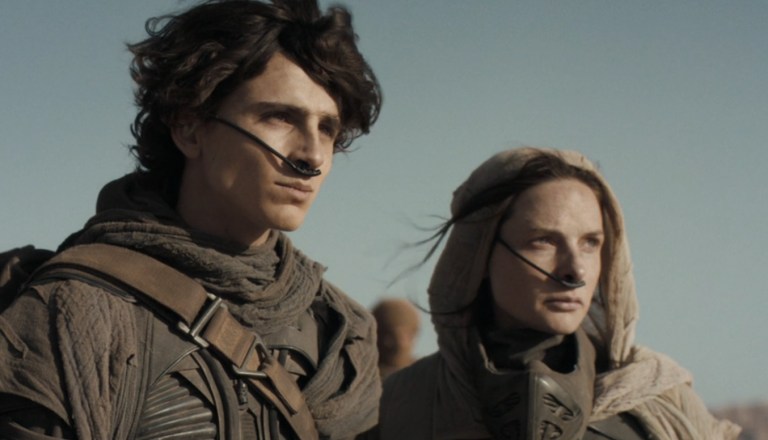
Many attempts to bring the rich universe of the Dune saga to big and small screens have been made. Most attempts barely got out of the planning stages before falling apart. Conveying the epic nature of Dune in a movie or TV series is a daunting task, and the few adaptations that made it through to completion met with varying degrees of success.
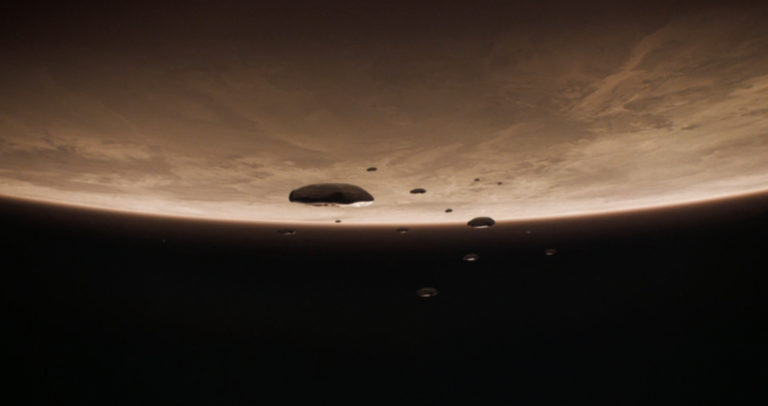
A new attempt was made with the release of the film Dune in 2021. The 2021 movie is an effort to be the most faithful and expansive adaptation of the original Dune novel while opening up possibilities for future films and spin-offs. Every new franchise needs a solid start, and Dune (2021) feels like a solid foundation if not a complete story on its own.
Background
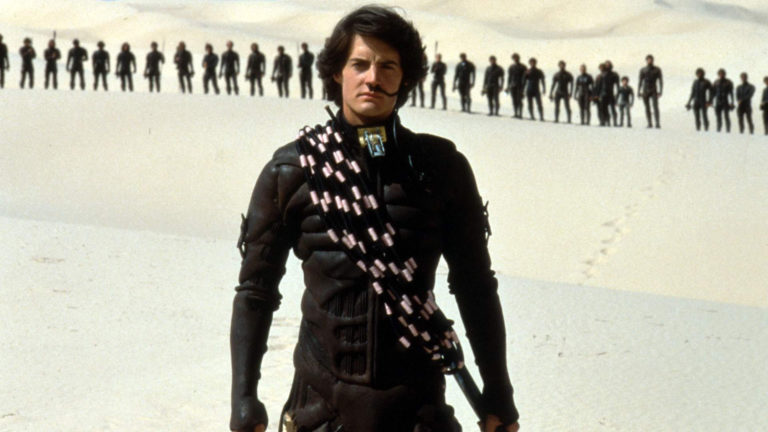
Dune (2021) is based on the 1965 novel of the same name by Frank Herbert (which was originally published as a serial in Analog magazine between 1963 and 1964). The 2021 films is the second major motion picture based on Herbert’s original novel, the first being David Lynch’s 1984 Dune. The novel was also previously adapted as a television miniseries in 2000 by John Harrison.
Dune is directed by Denis Villeneuve whose previous directing credits include Blade Runner 2049 (2017) and Prisoners (2013). The screenplay is written by Villeneuve, Jon Spaits (co-writer of Prometheus and Doctor Strange), and Eric Roth (writer of Forrest Gump and the 2018 A Star is Born).
The movie began a staggered theatrical release internationally in September of 2021, finally making its way to North American theaters on October 22, 2021. It was also released on HBO Max on the evening of October 21, 2021 for a one month stay before being pulled off the service and adhering to a more traditional home release schedule.
Review
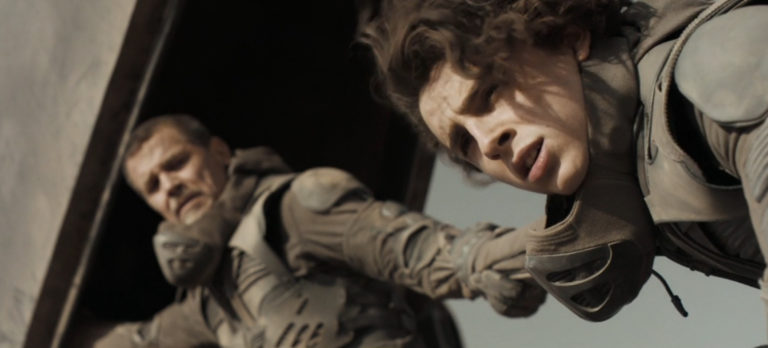
As with any big-budget attempt to adapt such a beloved story with over five decades of history and generations of fans, Denis Villeneuve had quite an unenviable task. To succeed, the film has to please everyone from longtime fans who know the lore by heart to the people experiencing Dune for the very first time. By all accounts, Dune is quite faithful to the original novel, with many viewers expressing joy in seeing on screen what they had envisioned while reading Herbert’s book. For those of us new to the universe, there is a bit of a learning curve.
At its most basic level, Villeneuve’s Dune tells the story of Paul Atreides (Timothée Chalamet) who is the son of Duke Leto Atreides (Oscar Isaac) and Lady Jessica (Rebecca Ferguson). As his father’s son, Paul’s lineage dictates that his future lies in politics and ruling entire worlds. Paul’s mother is part of a religious order (called Bene Gesserit) with seemingly mystical powers, and she has taught Paul their ways. Caught between two worlds, Paul seeks to make his own path in life. He gets that opportunity in a way he wasn’t expecting when things go badly after his father is instructed by the Emperor to take control of the spice-laden planet Arrakis.
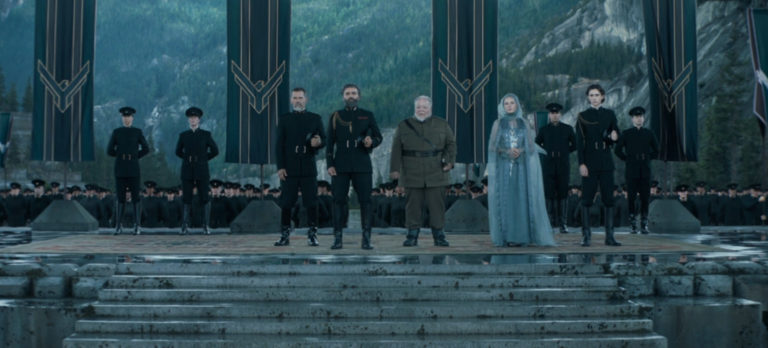
That summary is a gross over-simplification that may rile up Dune devotees, but saying much more isn’t necessary for the purposes of this review. The film is told from Paul’s perspective, and the broader universe is mostly conveyed to the viewer through Paul’s experiences as described above. At a high level, Paul’s story is a familiar tale. It’s the hero’s journey we’ve seen countless times before in characters such as Luke Skywalker, Neo, and Frodo Baggins (whose story, of course, pre-dates Paul’s). The intrigue is in the details of how the story is told.
There is much, much more to the story presented in Villeneuve’s Dune than just Paul having a tough time with his destiny. Political conflict drives much of the plot, as does the conflict between the people of Arrakis, the Fremen, and the empire that wants the planet’s valuable resource of spice. With so many details to explore, people unfamiliar with the lore may feel overwhelmed by the vastness of the universe.
The first forty-five minutes of Dune are spent on world-building and introducing characters. While we get a basic sense of who everyone is and what their personalities are like, it’s a lot to absorb on a single viewing. Many of the details may get lost because they aren’t truly reinforced until later in the movie’s two-and-a-half-hour runtime. At times it can feel like we’re studying alongside Paul as we watch him read books and watch holograms about Arrakis. It all makes sense in the end, but trying to hold on to every detail as you go might be a tedious task for some.
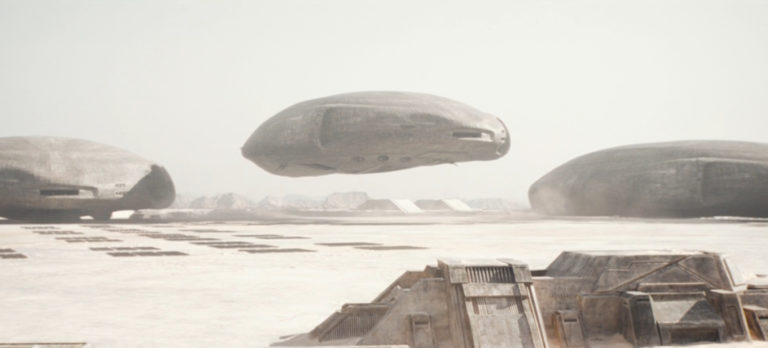
Speaking of the end, Dune announces itself as “Part One” in its opening title screen. The plan from Villeneuve was always to make Dune in multiple parts, but viewers who were unaware of that might be in for a surprise. Being one part of a larger whole, Dune isn’t able to (and doesn’t want to) pay off everything it sets up. Certain characters seen in the movie’s trailers barely affect the plot at all, and certain ideas that feel significant when introduced aren’t made particularly significant before the end credits roll. That is by design, but it still diminishes the movie’s ability to stand on its own. Using the aforementioned heroes as examples, Luke Skywalker and Neo both have a first movie that feels complete. Though Paul has a character arc similar to those characters, Villeneuve’s Dune ultimately feels like the first act in a three-act story (because it kind of is).
Even with all that said, one can’t help but marvel at the enormity of Villeneuve’s Dune. The visuals are often breathtaking and vast on a scale that invites further exploration. From the gigantic sandworms to the great array of technology, Dune feels like a living universe that we’re only getting a glimpse of. The movie was made to be seen on the biggest screen possible, so viewers opting for home streaming options are probably missing out on the full grandeur of the spectacle.
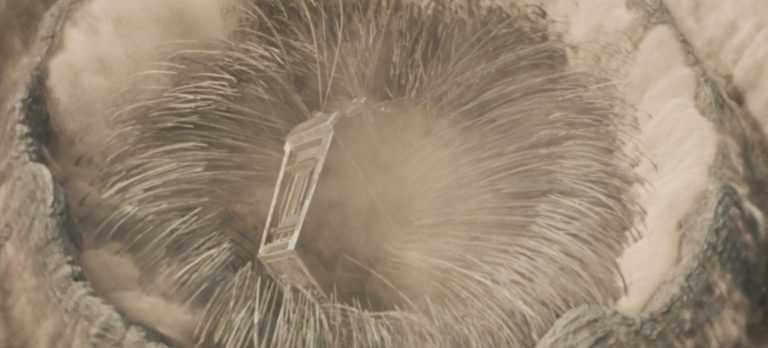
The overall look of the movie conveys the tone of the story. Taking place on a desert planet, the colors of the film are understandably muted with lots of browns, grays, and dark blues. That creates a serious and sometimes somber vibe, and Dune is a very serious movie. There is little in the way of levity, but whether that’s a good or bad thing comes down to personal taste. Regardless, just like the muted colors allows for certain colors to pop with importance such as when we see bright red blood or the shimmering blue eyes of the Fremen, the measured and serious way in which the plot progresses gives the action scenes added weight.
Beyond the visuals, Dune‘s greatest success comes from its ensemble cast. Including Timothée Chalamet, Oscar Isaac, and Rebecca Ferguson, Dune features Josh Brolin, Jason Momoa, Zendaya, Dave Bautista, Javier Bardem, Charlotte Rampling, and Stellan Skarsgård. These actors all give charismatic performances, and even though some get much more screen time than others, they are all able to convey a lot in the time they’re given.
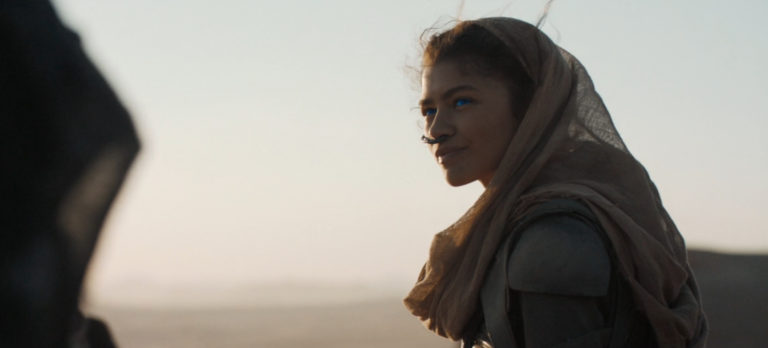
Dune provides a promise of an intriguing new start for the larger Dune franchise. New viewers captivated by the sights and sounds may find a second viewing more rewarding than the first after they’ve had time to absorb the lore presented. Watching Dune can feel like an investment in the future more than a singular experience, but there is still enough on screen to excite fans of epic sci-fi. Dune is serious science fiction on a grand scale that is well worth the investment.
What’s Next
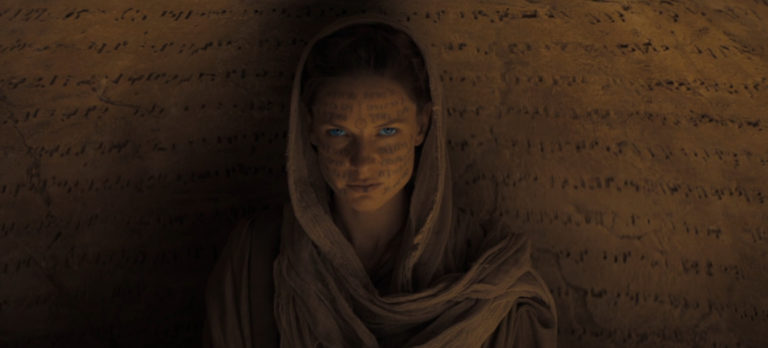
As of Dune‘s release, early development of the second part of the story is underway. Denis Villeneuve has stated that the possibility of a sequel would be determined by whether or not part one is a success, but it really seems like a forgone conclusion given the way this movie is presented. Villeneuve has expressed interest in making a trilogy with the third film being based on Frank Herbert’s 1969 Dune Messiah, but that remains to be seen.
Villeneuve is also involved in the production of a spin-off series that will stream on HBO Max. The series, titled Dune: The Sisterhood, will take place prior to the 2021 film and will focus on the Bene Gesserit.
Update: On October 26, 2021, the second part of Dune was officially announced by Legendary. The movie is scheduled to hit theaters on October 20, 2023.
